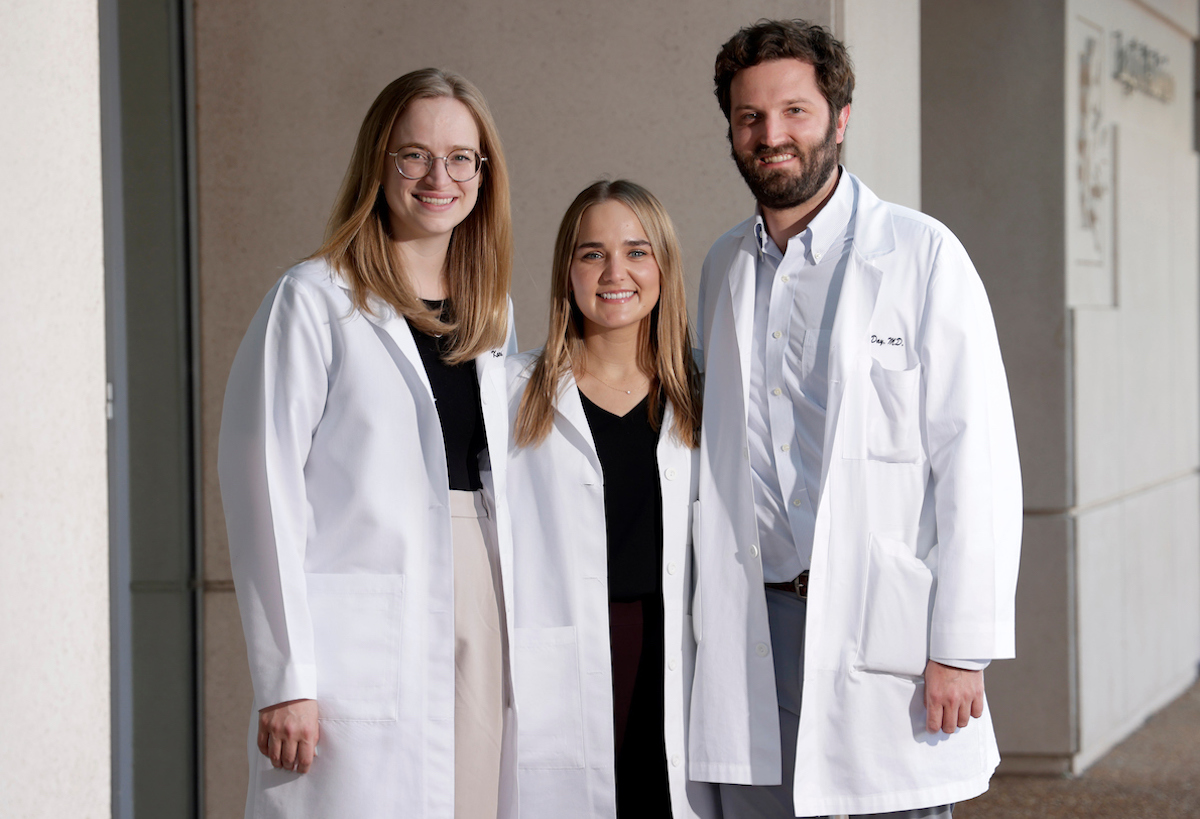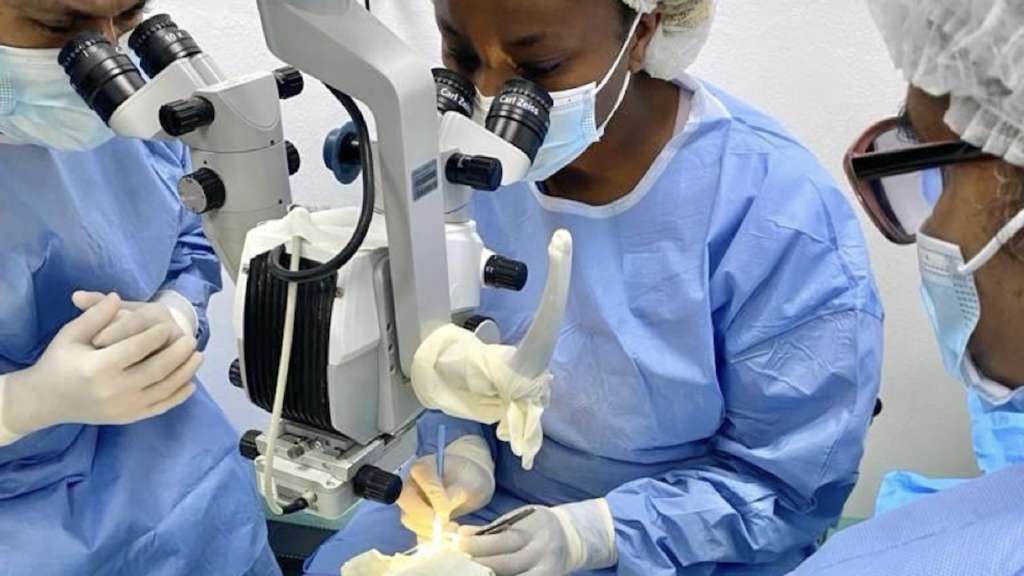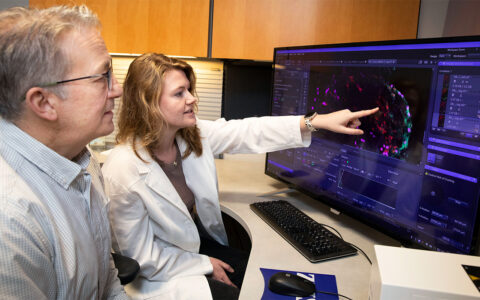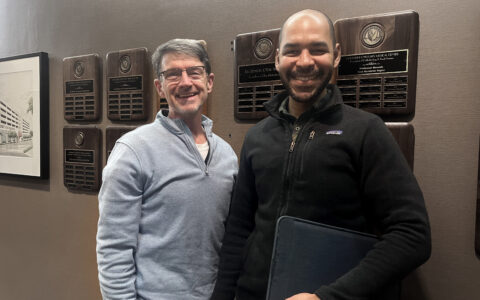Featured in the Vanderbilt Eye Institute Impact Report 2024. Peruse the rest of the Impact Report here.
Cataract surgery is one of many essential ophthalmic procedures where available techniques differ widely among developed and developing countries.
In Guyana, as in many sub-equatorial nations, the trend in the past for cataract removal has been to use manual small-incision cataract surgery (MSICS), rather than the more technologically intense phacoemulsification approach offered in American tertiary care centers, such as Vanderbilt Eye Institute (VEI).
To expose VEI residents to manual cataract surgery and other ophthalmic techniques, VEI has joined an international training partnership with Georgetown Public Hospital Corporation in Georgetown, Guyana.
Now in its third active year, the partnership evolved from Vanderbilt University Medical Center’s previous partnership with the Guyana hospital – which began in emergency medicine – and a follow-up conversation with Shailendra Sugrim, M.D., director of the ophthalmology clinic at Georgetown. Sugrim personally performs as many as 15 to 20 cataract procedures in a half day, including MSICS procedures.
“Vanderbilt Eye Institute believes training should incorporate a variety of experiences, including offering residents perspective on procedures and techniques that, while they may not be practiced widely in technologically advanced settings, remain vitally important around the developing world,” said Jennifer Lindsey, M.D., former director of VEI’s ophthalmology residency program.
VEI residents gain an element absent in other U.S.-based training programs by participating in initiatives that offer real-world insight into the distinct needs, conditions, and public health perspectives in the developing world, Lindsey added.
“Small-incision cataract surgery is a fantastic thing for them to learn, but the extra benefit is seeing different pathologies and stages of eye disease, as well as different diseases that we wouldn’t necessarily see here in the United States.”
At Georgetown’s hospital, Sugrim was clearly in need of more surgical support and expertise to meet an abundant demand for cataract surgery.
“Among our Guyanese patients, we encounter cataracts that are very mature or that have an extremely hard nucleus, so phacoemulsification would not be a viable option even with the medical equipment and resources. We have to operate via MSICS,” he said.
Residents Gain New Perspectives
The residents are there not only to learn but to help. In 2024, four out of five of VEI’s fourth-year residents took advantage of the opportunity to visit Guyana and immerse themselves in one- to two-week rotations working alongside Sugrim and his team.
The VEI trainees learned to perform MSICS in the Guyanese operating room, participated in the general clinic, and provided training on ophthalmic examination techniques and diagnostic approaches to the general physicians, medical students, nurses and staff.
Russell Day, a 2024 VEI residency program graduate, is among those whose visit to Guyana deeply elevated their appreciation for how the practice of surgery is intertwined with the broader public health landscape, especially when it comes to medical care access.
“For people in the public healthcare system, Georgetown may be the only place in the country where they can get cataract surgery, but the waiting list is up to six months,” Day said. “And with the country’s limited infrastructure, it’s difficult for many patients to even get to the hospital at all.”
“It is wonderful to see that just as our team benefits, the residents clearly gain so much from being in a different environment and having a global ophthalmology experience.”
Kari Fossum, another participating resident, is now a fellow in pediatric ophthalmology, a specialty that would be a welcome development in Guyana, said Sugrim, explaining that the country’s younger residents are severely undertreated.
“While they are able to perform pediatric cataract surgery, they do not currently have ophthalmologists specially trained in strabismus surgery, so children are referred out of the country for this treatment,” Fossum said.
In the coming months, pediatric ophthalmologist Meghan Flemmons, M.D., will be the first visiting VEI faculty member to join the Georgetown Hospital team — providing guidance and additional support in this critical area of need.

Seeds to Support More Program Growth
VEI gained a major boost recently through a generous donation from Richard Mackool, M.D., a New York ophthalmologist who specializes in cataract surgery. Mackool has a passionate interest in ophthalmology education, and his gift covered the expenses for all four 2024 residents.
“It was a once-in-a lifetime experience, and I felt very fortunate to have Dr. Mackool fund it for us,” said resident Nkechi Nwabueze. “You get to immerse yourself in another culture. And I felt like I had a lot of autonomy, which really helped me grow as a surgeon.”
Sugrim recently visited his long-distance VEI colleagues in Nashville for the first time.
“We discussed many exciting things, including how Vanderbilt might expand its support for our clinic and perhaps, eventually, help us establish our own ophthalmology residency program,” he said.
VEI is working with the Georgetown team to provide online access to educational tools, grand rounds lectures and other learning resources. Given Guyana’s broad need for eye-care expertise and training beyond cataracts, the program could grow to include other subspecialties.
Both teams agree the partnership is truly a winning proposition for all involved.
“It was an unforgettable experience that really emphasized how fortunate we are in the United States with access to care, medicines, and surgical tools,” said resident Nicole Morrow.
In addition to sparking interest in global medicine, the experience puts surgical skills to the test, Lindsey noted.
“When you have to learn a new technique quickly and do a very high volume of surgeries, it improves your surgical abilities in a very short period.”
Added Sugrim: “It is wonderful to see that just as our team benefits, the residents clearly gain so much from being in a different environment and having a global ophthalmology experience.”



